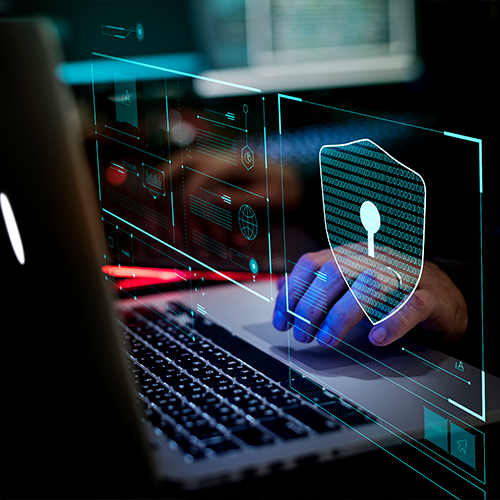
As a company, we take pride in providing top quality cyber security services in Noida Our team of experts is dedicated to protecting and safeguarding your organization’s digital assets from cyber threats. With our comprehensive cybersecurity solutions, including risk assessment, penetration testing, incident response, and compliance advice, we ensure your business stays on track security and resilience in the face of evolving cyber threats. Trust us to deliver the best cybersecurity services tailored to your specific needs, giving you peace of mind and confidence in your digital transactions.
what is cybersecurity ?
Cybersecurity is the process of protecting computer systems, networks, devices and data from unauthorized access, cyber attack, theft or destruction It encompasses a range of technologies, processes and practices designed to protect and ensure digital assets privacy, integrity and availability of information , reduce the risk of bad guys like hackers, malware, ransomware, insider threats by implementing preventive measures like antivirus software, encryption, access control and security policies Again also, cybersecurity requires proactive monitoring, detection and response to security incidents It is possible in general, to protect sensitive information, Cybersecurity is necessary to build trust among customers and stakeholders , and ensure the resilience of digital systems in an increasingly connected world
Key features of cybersecurity:

- Threat Detection and Prevention
- Access Control
- Data Encryption
- Vulnerability Management
- Security Awareness Training
- Endpoint Security
- Network Security
- Cloud Security
- Compliance and Regulatory Compliance
The future of cybersecurity will be characterized by:
- Artificial Intelligence and Machine Learning: AI and ML will play a key role in better identifying threats, automating response strategies, predicting cyberattacks and developing effective prevention strategies.
- Zero Trust Architecture: Adoption of zero trust principles will be more widespread, with a focus on continuous authentication and tight access controls to reduce insider threats and unauthorized access on.
- Quantum Computing Challenges: The advent of quantum computers will bring new challenges to traditional methods of encryption, leading to the development of quantum-resistant cryptography to ensure data security in a post-quantum world.
- Internet of Things (IoT) Security: With the proliferation of connected devices, IoT security will become a major focus, requiring robust security measures to protect against vulnerabilities and ensure the integrity and confidentiality of IoT data.
- Cloud Security : As more organizations migrate to the cloud environment, protecting cloud infrastructure and data becomes paramount, and will require advanced security controls, encryption, and visibility in cloud environments.
- Cybersecurity skills gap: The shortage of cybersecurity professionals will continue to be a challenge, leading to the need for skills upgrade and resupply programs, as well as increased automation to manage talent dealing with the absence of.
- Compliance: The legal landscape will change, and stricter data protection and privacy laws will allow organizations to prioritize compliance and implement stronger security measures to avoid legal penalties and defamation of reputation.
- Cybersecurity collaboration: Collaboration and information sharing between organisations, businesses and governments will be increasingly important to address sophisticated cyber threats and effectively plan responses.
- Cyber Resilience: Building cyber resilience will be a key focus, with organizations prioritizing measures such as incident response planning, cyber insurance and security audits routine will first mitigate the impact of cyberattacks.
- Emerging Threats: Cybercriminals will continue to innovate and evolve, leveraging emerging technologies such as AI, IoT, and ransomware-as-a-service to launch sophisticated and targeted cyberattacks, requiring continued vigilance and active defense strategies.
-
What are some common cyber threats that businesses face?
Companies face a variety of cyber threats, including phishing, malware, insider threats, ransomware, DDoS attacks, data breaches, social engineering, credential theft, supply chain attacks, and every day exploitation These threats can result in loss of revenue, reputational damage and business disruption. To mitigate risks, companies should prioritize cybersecurity policies, employee training, and proactive defense measures.
-
What are the benefits of implementing a cyber security policy?
Implementing a cyber security system provides businesses with many benefits, including risk mitigation, compliance, sensitive data protection, incident response planning, personnel awareness and training, increased reliability and reputation, continuous operations, vendor partner management, and continuous improvement f Cost savings By establishing clear safety standards and procedures, companies can reduce against potential cyberattacks, protect sensitive information, demonstrate their commitment to cybersecurity, and ultimately protect their operations, reputation and finances.
-
How can companies ensure that their networks are secure?
Companies can ensure that their network infrastructure is secure through firewalls, intrusion detection systems, access controls, network segmentation, patch management, encryption, network management, endpoint security measures, security policies, training programs and implementation of incident response systems These policies prevent unauthorized access, detect and mitigate security threats , confidentiality, integrity, availability of network resources and data and it helps in monitoring.
-
How can businesses protect their online transactions and financial information?
Companies can secure their online transactions and financial information by using encryption for data transfers, using secure payment gateways, tokenizing sensitive information, two-factor processing, policy implementation of various fraud detection measures, regular security audits, employee training, implementation of data security measures stability. These mechanisms help protect against unauthorized access, fraud and data breaches, and protect customer confidence and the financial integrity of the business.
- Web Development
- IT Management
- App Development
- Digital Marketing
- Graphics Design
- Data Analytics
- UI/UX Design
- AI Solutions
- Cyber Security
Brochures
Contact Info
-
Phone: +91 943-100-5867
-
C291,2nd Floor,Noida Sector-10 Gautam Buddha Nagar 201301
-
Email: info@bharattechlab.com
